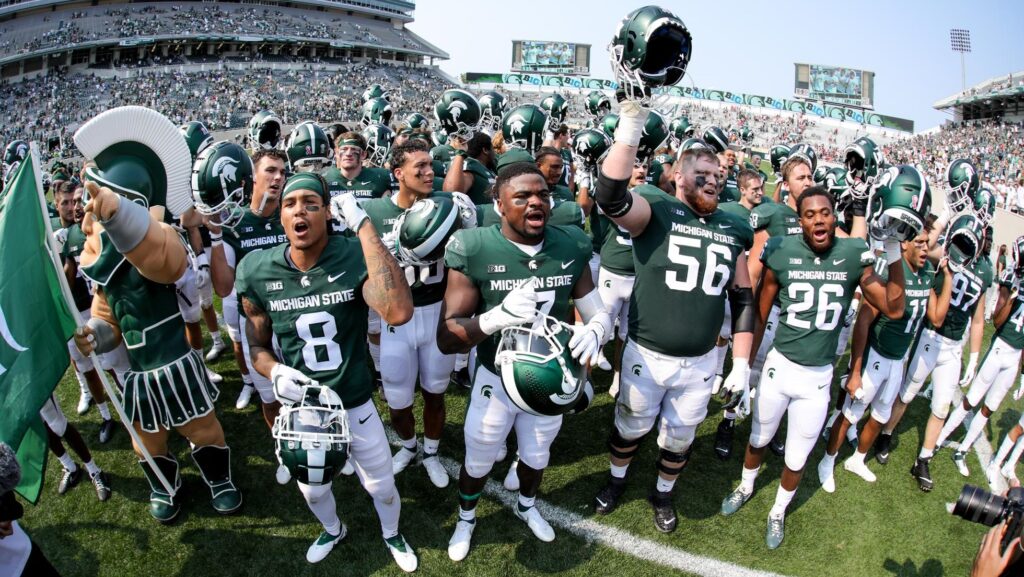Team History
The Michigan State Spartans football program has roots tracing back to 1896, making it one of the oldest in the nation. Its history is a tapestry woven with periods of both triumph and hardship. While the program experienced early success, it has also faced challenges and undergone significant transformations. Today, the Spartans are a respected and formidable force in the Big Ten Conference and on the national college football stage.
The legacy of the Spartans is characterized by a gritty, hard-nosed style of play that reflects the blue-collar ethos of Michigan. Throughout the years, the Spartans have been known for their tough defense and a powerful ground game, earning them a reputation as a team that thrives in adverse conditions.
Foundation and Early Years
The Michigan State Spartans football program debuted in 1896 under the name Michigan Agricultural College Aggies. Early successes include claiming an unofficial state championship in 1903. Over the following decades, the team gained recognition through strong performances and rivalries with the University of Michigan.
In 1925, the school officially changed its name to Michigan State College and adopted the Spartans identity. This era also saw the program move into its newly built Macklin Stadium, which provided a dedicated home field advantage. The move to the new stadium and the change of identity marked a pivotal moment in establishing the foundation of the Spartans program we know today.
Notable Early Achievements
The Spartans clinched their first outright conference championships in 1951 (Big Ten Conference) and followed it up with a truly dominant stretch. Under head coach Duffy Daugherty, Michigan State won national championships in 1952 and had another shared title in 1953. Additionally, the team took home Rose Bowl victories in 1954 and 1956, cementing their status as a national powerhouse.
The 1965 and 1966 seasons saw the Spartans, fueled by stars like Bubba Smith and George Webster, secure back-to-back national championships—though these titles were shared. Still, this period remains a golden era in Michigan State football history, marked by legendary players and iconic wins.
Periods of Change
The decades following this success brought ups and downs. Coaching changes and program direction shifts led to inconsistent results. Despite talented players and occasional great seasons, the Spartans struggled to recapture the sustained dominance of the 50s and 60s. However, the Spartans still managed to produce legendary coaches and players that would inspire future generations.
The arrival of transformative coaches like George Perles in the 1980s and later Mark Dantonio in the mid-2000s would mark significant turning points for the program. They brought discipline, a renewed focus on defense, and a sense of purpose back to the Spartans, allowing them to once again challenge for Big Ten supremacy. These periods of rebuilding and strategic shifts have been essential to the team’s longevity.
Championships and Achievements
The Spartans boast a proud legacy of championship success. They have:
- National Championships: 6 (1951, 1952, 1955*, 1957*, 1965*, 1966*)
- Big Ten Championships: 12
- Bowl Appearances: 30 including notable wins in the Rose Bowl, Cotton Bowl, and Peach Bowl.
Michigan State has produced countless legendary players and coaches; many have gone on to successful NFL careers. The team’s trophy case reflects a history marked by excellence on the highest stages of college football.
Management and Coaching Staff
The Michigan State Spartans have a highly regarded coaching staff, renowned for player development and tactical acumen. Head coach Mel Tucker brings energy and innovative strategies to the team, and he is supported by a talented group of coordinators and position coaches.
Home Stadium Information
The Spartans play their home games at the iconic Spartan Stadium in East Lansing, Michigan. Initially built in 1923, the stadium has undergone expansions and renovations over the years, now boasting a capacity of over 75,000. Spartan Stadium provides an intimidating atmosphere for opponents, particularly with its dedicated student section, “The Deep End”, known for its passionate support.
-
*********** ***** ******* *** ***** ** ************ **** ********* *****dd.mm.yyyy 00:00 PM
-
****** *********** **** ** ***** ****** *** **** *** ******: ********* *** ******* *** ****'* ****dd.mm.yyyy 00:00 PM
-
*********-***** ********: **** 6 **** *** ***** *** * ********* **** 7dd.mm.yyyy 00:00 PM
-
**********-************ *******: ****** ****ć, ******* *******, *** * ********* ********** ********dd.mm.yyyy 00:00 PM
-
********* **** ********* ** *** ***: ********* *** ********* ** ****** ******** **. *** *** *****dd.mm.yyyy 00:00 PM
-
****************** ******* **********: *** ********' **** ****dd.mm.yyyy 00:00 PM







